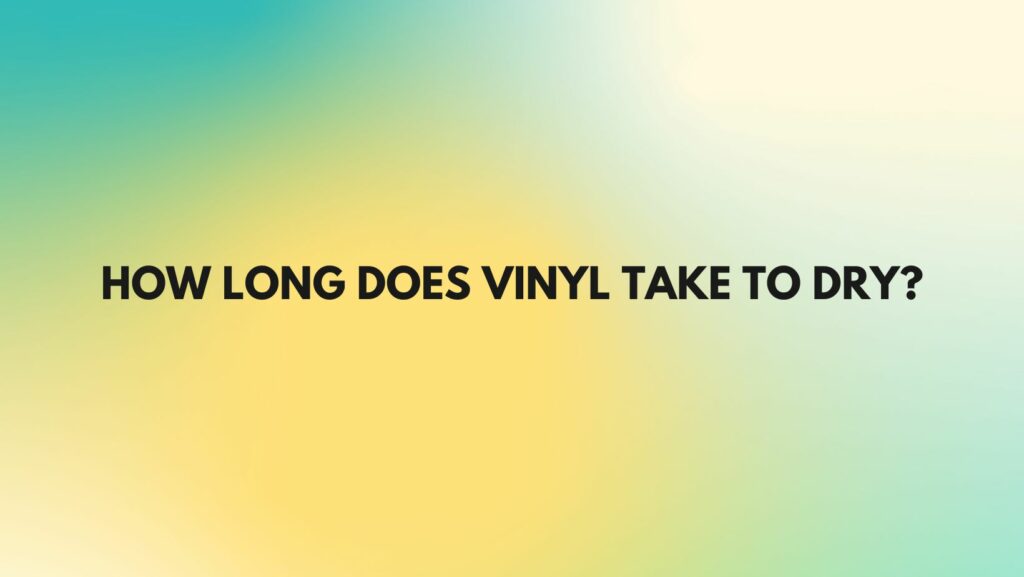In the world of vinyl enthusiasts, the care and maintenance of records are paramount to preserving their integrity and sound quality. Central to this process is the cleaning of vinyl records, a meticulous ritual aimed at removing dust, debris, and contaminants to ensure optimal playback performance. However, a common question that arises is how long it takes for vinyl records to dry after undergoing the cleaning process. As audiophiles seek to strike the perfect balance between cleanliness and convenience, understanding the intricacies of vinyl drying time becomes essential. Let’s explore the factors that influence drying time and offer insights into best practices for ensuring that records are thoroughly dried before playback.
The Significance of Drying Vinyl Records
After cleaning, vinyl records must be allowed to dry thoroughly before being played. Excess moisture left on the record’s surface can interfere with the stylus’s ability to track the grooves accurately, leading to potential skipping, surface noise, and even damage to the record and the turntable stylus. Proper drying ensures that the record is in optimal condition for playback, allowing listeners to enjoy the music with clarity and fidelity.
Factors Affecting Drying Time
Several factors contribute to how long it takes for vinyl records to dry after cleaning:
- Cleaning Method: The method used to clean the record significantly impacts drying time. Manual cleaning methods, such as using a cleaning solution and microfiber cloth, may require less drying time compared to more intensive methods involving record cleaning machines or wet cleaning systems. The amount of moisture applied during cleaning and the effectiveness of the drying method employed also influence overall drying time.
- Environmental Conditions: Environmental factors, including temperature, humidity, and airflow, play a crucial role in drying time. Records dried in a warm, dry environment with good airflow will dry more quickly than those left in a cool, humid environment with limited airflow. It’s essential to consider these factors when determining the optimal drying conditions for records after cleaning.
- Record Material and Condition: The material and condition of the record itself can affect drying time. Records made of thicker, heavier vinyl may take longer to dry than thinner, lighter records. Additionally, records with deep grooves or surface imperfections may retain moisture more effectively, requiring additional drying time to ensure thorough evaporation.
Best Practices for Drying Vinyl Records
To ensure that vinyl records are properly dried before playback, consider the following best practices:
- Allow Adequate Drying Time: As a general guideline, it’s recommended to allow records to dry for at least 30 minutes to 1 hour after cleaning, depending on the cleaning method used and environmental conditions. Thicker records or records cleaned with a wet cleaning system may require longer drying times to ensure thorough evaporation of moisture.
- Monitor Drying Progress: Periodically check the records during the drying process to assess their moisture levels and ensure that they are drying evenly. Avoid exposing records to excessive heat or direct sunlight, as this can cause warping or damage to the vinyl.
- Use Proper Drying Techniques: To facilitate the drying process, place records in a vertical position on a clean, dry surface, allowing any excess moisture to evaporate naturally. Avoid stacking records or using fans or heat sources to accelerate drying, as this can lead to uneven drying and potential damage to the vinyl.
Conclusion: Patience and Precision
In conclusion, while the temptation to play a freshly cleaned record may be strong, exercising patience and allowing sufficient drying time is essential to ensure optimal playback quality and preserve the integrity of both the record and the turntable. By understanding the factors that influence drying time and adhering to best practices for drying vinyl records, enthusiasts can enjoy the timeless magic of vinyl with clarity, fidelity, and peace of mind, knowing that each spin is a testament to their dedication to the art of analog audio.

